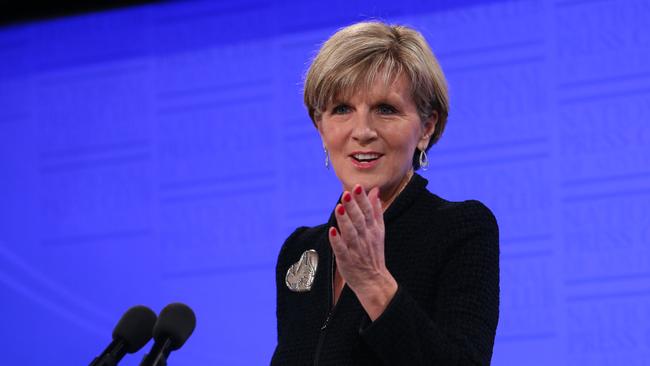Julie Bishop’s career would have been different if she’d had kids
JULIE Bishop doesn’t think she’s at a disadvantage because she’s a woman, and doesn’t acknowledge the glass ceiling. But she’s missing a very obvious point.

Careers
Don't miss out on the headlines from Careers. Followed categories will be added to My News.
FIRST of all. Good on Julie Bishop. She’s clearly a very competent woman doing an extraordinary job as the only female member of Federal Cabinet.
As Foreign Minister, it’s her job to advance Australia’s interests throughout the world, and by all reports, she’s doing a good job, using her strong, diplomatic skills.
Yesterday speaking at the National Press Club Woman in Media event, Ms Bishop touched on a number of controversial topics.
She said she doesn’t define herself by her gender, and won’t acknowledge the glass ceiling.
“I refuse to acknowledge it. I’m not saying it doesn’t exist, I’m not saying that at all. If I want to do something I will work hard and try to do it. If it doesn’t happen I’m not going to blame the fact that I’m a woman. I’m not going to see life through the prism of gender.”

But while Ms Bishop might feel the glass ceiling doesn’t apply to her, she has acknowledged in the past that it could be because she doesn’t have children.
Speaking to The Sunday Telegraphin February 2013, Ms Bishop said that women make choices in their lives, and having a family makes it difficult to throw everything into your career,
“I’m in the Anne-Marie Slaughter school — women can’t have it all,” Ms Bishop said. “They can have plenty of choices, but at the end of the day, they choose something which means they can’t have something else.”
She’s right. Our foreign minister is incredibly ambitious and works long hours.
She has spent many years working hard to get where she is. Years other women spend raising young children.
While there are senior women in business and politics who do manage to juggle young families and a top career, they’re not common in Australia.

Annabel Crabb explains in her book The Wife Drought, only 22 per cent of Australian mothers work full time. And only three per cent are the sole breadwinners of their families.
That statistic isn’t surprising.
Biologically, it’s women who need to take at least the initial time off after having a baby.
And while some women manage to return to their full time jobs quickly; most make the choice to take extended leave.
Even when mums do return to work, our commitment to our careers has changed.
No longer can we be the first in the office and the last out the door.
We probably can’t make those networking drinks.
And when our gorgeous toddler has a fever, conjunctivitis, or whatever random bug is going through the child care centre — we leave work, and look after them.
We may have to leave work early or change our working hours to fit in the school pick-up.
Ms Bishop is right. This is a choice we make.
Whether to have kids or not. Whether to stay at home and raise them. Whether to work part time, full time, study, or even keep working to be the next CEO of your company. They’re all choices that women of Australia make, and they’re all incredibly personal. There is no right or wrong choice.
Julie Bishop yesterday argued that there should be no difference between herself and her male peers.
“I’m a female politician, I’m a female foreign minister. Yeah well? Get over it.”
But for women who have made the choice to become mothers, it’s not as easy to ‘get over it’.
The glass ceiling might be vanishing for women without kids — but mothers have other priorities in their lives — they’re naturally at a disadvantage in their careers.

Before I had a child I very rarely saw myself as a ‘woman’ in the workplace. I was just an employee, like everyone else. I had equal opportunities to have an education, I’ve had equal chances to advance my career, and equal time to network and develop relationships that have helped me achieve my goals.
But I knew making the choice to start a family would mean that time would come to an end.
Work is no longer my number 1 priority. My family is.
While I work full time, I’ve chosen to work the morning shift, allowing me spend the afternoons with my son. I leave on time every day (something I never did before kids). And I’m glad that I do — I love spending hours each day with him playing with magnets on the fridge or reading ‘Ten Little Fingers, Ten Little Toes’.
Unless I organise a babysitter, I’m not going to any workplace drinks any time soon.
And while I’m happy with my choice — I’m very aware it’s making me less able to advance my career.
In The Wife Drought, Annabel Crabb (who has three kids), describes the super-human effort it takes to juggle a career and three young children.
She argues mothers who want a demanding career need a partner who can take over the bulk of childcare (whether he’s in a flexible job, or a stay at home dad).
Until the time that it’s normal for fathers to step back from their own careers to look after their kids, there’ll be thousands of mums in Australia who’ll continue to face the glass ceiling, and no, we can’t just “get over it”.
Twitter: @KateCalacouras
Originally published as Julie Bishop’s career would have been different if she’d had kids


